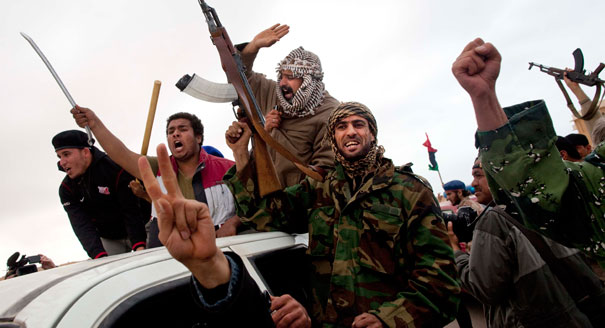Imagine you are having a family argument and hear the doorbell ringing. The police have heard loud voices and would like to know what happened, to intervene and also take sides. We would see this as inappropriate. The same argument applies in international relations. No foreign country has the authority or right to interfere in matters of another country on a slight pretext.
The sovereignty of a country is considered sacred. The population alone should decide how to govern their country and who should do so. Of course, not every government enjoys public legitimacy. There are countries that are democratic, others are less democratic and others still that are not democratic at all. However, as defective as the system of government in a country might be, outside intervention is still not necessarily justifiable. So where do we draw the line?
As we know, the situation in Libya is getting worse every day. We do not know how many people have been killed in the riots or by the Libyan regime.
The popular Libyan movement against the government was inspired by the neighbouring Tunisian and Egyptian uprisings. At the same time we see the military forces of the Gaddafi regime and African soldiers armed to their teeth with weapons and ammunition sold to them by Europeans. On the streets of Tripoli, civilians are facing atrocious acts of violence. As Europeans and Maltese, how should we respond?
Moreover, when violence grows out of proportion, including crimes against humanity and genocide, our perspective changes again.
Such a situation would surely justify groups of other countries to intervene to stop the killing of innocent people. Because, to revisit the example of the family argument, if it escalates into domestic violence and one part were to ask for help then you would expect the police to take action.
The problem is that we don’t have a global police force. Instead, we have an ever-changing coalition of countries whose interests change constantly too, especially when we see that the country in crisis has a resource as valuable as oil. Thus, the problem gets more complicated.
This is not just a matter of sending humanitarian aid, medicines, food or clothes, or helping innocent refugees caught in the midst of all this. Rather, it is leading to a situation where military intervention of some sort cannot be avoided and, therefore, outside force needs to be used on a sovereign country. Such intervention should never be undertaken by an individual country.
Even when intervention is taken by a group of countries it does not mean there is any easy solution – experiences in Afghanistan and Iraq demonstrated this. It is not always the case that intervention is acceptable to the people involved in these situations, especially if it risks eroding their original legitimacy. There is often scepticism regarding the real interests of whoever is intervening. Such a situation therefore strengthens the argument that, should there be “foreign interference”, it should be by the United Nations. But what if the UN does not or cannot act?
This brings me to the point about the role of our country. Malta has made a large contribution. The numerous flights operated by Air Malta enabled the evacuation of thousands of people; the army and the civil aviation together with private participation, primarily with the catamaran trips of Virtù Ferries, have been instrumental. To this we must add the port facilities and naval vessels that were used for foreign passengers being evacuated from Libya, thousands of workers from about 90 different countries. As a nation we should be proud of what we have done to help.
If military action is to be taken in Libya, Malta should give it a wide berth. There are British and American military bases in Cyprus and Italy respectively. However, in the event of a horrible genocide taking place and being asked by the Libyan people to assist, we should not just stand by and do nothing. History would not forgive us.
What is unquestionable is that events in Libya will lead to high emigration, legal and illegal, by those wanting to escape from danger. The situation on the Libyan/Tunisian border is a vivid picture of what will happen.
Our country should seize the opportunity to highlight its great contribution to the rest of the EU. As I explained this week in Parliament, we acted not because we were following an EU directive but because Malta felt there were good and humanitarian reasons. Hence, I am insisting in the European Parliament we now expect the EU to intervene on the issue of immigration and unblock once and for all the illogical system that is being followed by Dublin II.
Other countries must not remain silent simply because the crisis in the countries of North Africa is far from their borders. Now is the opportune moment for Malta to turn on the EU and firmly insist we demand fair treatment on the question of North African immigration. Then we will know whether or not the EU’s concept of solidarity is just hot air.
www.timesofmalta.com – 11 ta’ March, 2011

One response to “Libya: Is intervention justifiable?”
I like this blog very much, Its a rattling nice place to read and
obtain info.Blog money